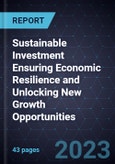An Accelerated Sustainability-driven World Economy Could be Worth $221.41 Trillion by 2030
In a rapidly evolving economic and geopolitical landscape, climate change, environmental preservation, and sustainable development have gained importance on the global policy stage. The objectives outlined in the UN Sustainable Development Goals and the Paris Agreement offer extensive guidance for transitioning toward a green, low-carbon global economy. Realizing these ambitious net-zero goals necessitates immediate, comprehensive, and unprecedented actions by policymakers to catapult a stable flow of substantial investment toward sustainable industries and practices.
The Green Taxonomy framework, being rapidly adopted across major countries around the world, has the potential to steer capital toward high-value and sustainable sectors, ultimately reducing economic reliance on natural resources, limiting the degree of the polycrisis, and enhancing both the magnitude and sustainability of economic growth.
This thought leadership piece is crucial as critical policy elements, such as green taxonomy, provide standardized frameworks to identify environmentally sustainable activities and investments. In an era of pressing climate and environmental challenges, it enables governments, businesses, and investors to make informed decisions that support the transition to a sustainable, low-carbon economy. Sustainable finance drives capital toward green initiatives, fosters innovation, and bolsters the resilience of financial systems, contributing to a more sustainable and prosperous future for society and the planet.








